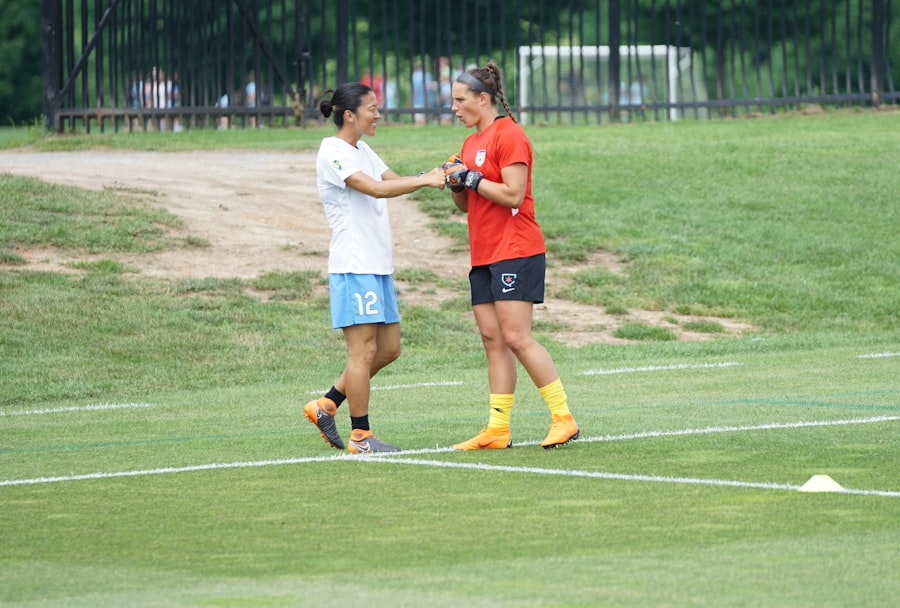
Interpersonal skills are the bedrock of effective communication and collaboration in any team setting. These skills encompass a range of abilities, including active listening, empathy, verbal and non-verbal communication, and the capacity to build rapport with others. In a world where teamwork is increasingly essential for success, the ability to interact positively with colleagues can significantly influence productivity and morale.
For instance, a team member who actively listens and responds thoughtfully can foster an environment where everyone feels valued and understood, leading to enhanced cooperation and innovation. Moreover, interpersonal skills are not just beneficial for individual interactions; they play a crucial role in shaping the overall dynamics of a team. Teams that prioritize strong interpersonal relationships often experience higher levels of engagement and commitment from their members.
When individuals feel connected to their peers, they are more likely to contribute ideas, share feedback, and support one another in achieving common goals. This interconnectedness can lead to improved problem-solving capabilities, as diverse perspectives are welcomed and integrated into the decision-making process. Thus, understanding and cultivating interpersonal skills is vital for any team aiming for long-term success.
Key Takeaways
- Interpersonal skills are crucial for effective teamwork and collaboration
- Effective communication is essential for a successful team
- Trust and collaboration are key for building a strong team dynamic
- Conflict resolution and managing differences are important for maintaining team harmony
- Leveraging individual strengths can lead to overall team success
Developing Effective Communication within a Team
Effective communication is the lifeblood of any successful team. It involves not only the exchange of information but also the clarity and understanding that accompany it. To develop effective communication within a team, it is essential to establish clear channels through which information can flow freely.
This might include regular meetings, collaborative platforms, or even informal check-ins that encourage open dialogue. For example, utilizing tools like Slack or Microsoft Teams can facilitate real-time communication, allowing team members to share updates and insights without the constraints of traditional email. In addition to establishing communication channels, it is equally important to promote an environment where team members feel comfortable expressing their thoughts and opinions.
Encouraging open discussions can help break down barriers and foster a culture of transparency. Techniques such as brainstorming sessions or feedback loops can be instrumental in this regard. When team members know that their voices are heard and valued, they are more likely to engage actively in discussions, leading to richer ideas and solutions.
Furthermore, effective communication also involves being mindful of non-verbal cues; body language, tone of voice, and facial expressions can all convey messages that words alone may not capture.
Building Trust and Collaboration Among Team Members

Trust is a fundamental component of any high-functioning team. It serves as the glue that holds team members together, enabling them to collaborate effectively towards shared objectives. Building trust requires consistent effort and transparency from all members.
One effective strategy is to encourage team-building activities that allow individuals to get to know one another on a personal level. These activities can range from casual social gatherings to structured workshops designed to enhance teamwork skills. For instance, participating in an escape room challenge can help team members learn to rely on each other’s strengths while having fun in a low-pressure environment.
Collaboration thrives in an atmosphere of trust where individuals feel safe to take risks and share their ideas without fear of judgment. When team members trust one another, they are more likely to engage in constructive feedback and support each other’s growth. This collaborative spirit can be further enhanced by recognizing and celebrating collective achievements, which reinforces the idea that success is a shared endeavor.
By fostering an environment where trust is prioritized, teams can unlock their full potential and achieve remarkable results.
Resolving Conflict and Managing Differences
| Metrics | Data |
|---|---|
| Number of conflicts resolved | 25 |
| Percentage of conflicts resolved within 24 hours | 80% |
| Number of team members trained in conflict resolution | 15 |
| Customer satisfaction rating after conflict resolution | 4.5 out of 5 |
Conflict is an inevitable part of any team dynamic, arising from differing opinions, work styles, or personal values. However, how a team approaches conflict can significantly impact its overall effectiveness. Rather than viewing conflict as a negative force, it can be reframed as an opportunity for growth and understanding.
Effective conflict resolution begins with open communication; team members should feel empowered to express their concerns in a respectful manner. For example, implementing a structured approach to conflict resolution—such as the “interest-based relational approach”—can help individuals focus on mutual interests rather than positions, facilitating a more collaborative resolution process.
These rules might include guidelines for respectful communication or protocols for escalating unresolved issues to a mediator or team leader. By creating a framework for addressing conflict, teams can minimize misunderstandings and ensure that differences are managed constructively. Furthermore, training sessions on conflict resolution techniques can equip team members with the skills needed to navigate challenging situations effectively.
Ultimately, embracing conflict as a natural aspect of teamwork can lead to deeper understanding and stronger relationships among team members.
Leveraging Individual Strengths for Team Success
Every team member brings unique strengths and talents to the table, and recognizing these individual contributions is essential for maximizing team performance. Acknowledging each person’s skills not only boosts morale but also enhances overall productivity by ensuring that tasks are assigned based on expertise. For instance, if one team member excels in data analysis while another has exceptional creative skills, assigning them complementary roles in a project can lead to more innovative outcomes.
Tools like StrengthsFinder or the Myers-Briggs Type Indicator can help teams identify individual strengths and preferences, facilitating better alignment of roles. Moreover, leveraging individual strengths fosters a sense of ownership among team members. When individuals feel that their unique abilities are valued and utilized effectively, they are more likely to take initiative and contribute meaningfully to the team’s objectives.
This approach also encourages continuous learning; as team members collaborate on projects that align with their strengths, they can develop new skills and expand their capabilities. By creating an environment where individual strengths are recognized and celebrated, teams can cultivate a culture of excellence that drives collective success.
Fostering a Positive Team Culture

A positive team culture is characterized by mutual respect, support, and a shared sense of purpose. Cultivating such an environment requires intentional efforts from all team members. One effective way to foster positivity is through recognition programs that celebrate individual and team achievements.
Acknowledging hard work not only boosts morale but also reinforces desired behaviors within the group. For example, implementing a “team member of the month” program can motivate individuals to strive for excellence while also promoting camaraderie among peers. Additionally, promoting work-life balance is crucial for maintaining a positive culture within teams.
Encouraging flexible work arrangements or providing resources for stress management can help prevent burnout and enhance overall well-being. When team members feel supported in their personal lives, they are more likely to bring their best selves to work. Furthermore, regular check-ins focused on well-being can create an open dialogue about mental health and work-life balance issues, reinforcing the idea that the organization values its employees as whole individuals rather than just workers.
Enhancing Emotional Intelligence for Better Team Dynamics
Emotional intelligence (EI) plays a pivotal role in shaping effective teamwork dynamics. It encompasses the ability to recognize one’s own emotions as well as those of others, facilitating better interpersonal interactions. Teams with high emotional intelligence tend to navigate challenges more effectively because members are attuned to each other’s feelings and needs.
For instance, a leader who demonstrates empathy during stressful periods can help alleviate tension within the group by acknowledging concerns and providing support. Training programs focused on developing emotional intelligence can significantly enhance team dynamics. These programs often include exercises aimed at improving self-awareness, empathy, and emotional regulation skills.
By equipping team members with these competencies, organizations can foster an environment where individuals feel understood and valued. Moreover, leaders who model emotionally intelligent behaviors set the tone for the entire team; when leaders demonstrate vulnerability and openness about their emotions, it encourages others to do the same.
Implementing Strategies for Effective Teamwork
To translate the principles of effective teamwork into practice, organizations must implement concrete strategies that promote collaboration and engagement among team members. One such strategy is establishing clear goals and expectations at the outset of any project. When everyone understands their roles and responsibilities within the larger context of the team’s objectives, it minimizes confusion and enhances accountability.
Utilizing project management tools like Trello or Asana can help teams track progress and stay aligned on tasks. Another effective strategy involves regular reflection sessions where teams assess their performance and identify areas for improvement. These sessions provide an opportunity for open dialogue about what worked well and what could be enhanced in future collaborations.
By fostering a culture of continuous improvement, teams can adapt their approaches based on feedback and experiences over time. Additionally, incorporating diverse perspectives into decision-making processes—whether through brainstorming sessions or inclusive discussions—can lead to more innovative solutions while ensuring that all voices are heard. In conclusion, effective teamwork is not merely about assembling individuals with complementary skills; it requires intentional efforts to cultivate interpersonal relationships, foster trust, manage conflicts constructively, leverage individual strengths, promote positivity, enhance emotional intelligence, and implement strategic practices that support collaboration.
By prioritizing these elements within teams, organizations can create environments where individuals thrive collectively while achieving remarkable outcomes together.
When discussing the importance of teamwork and establishing interpersonal skills in the workplace, it’s essential to also consider leadership abilities that complement these competencies. A great resource to explore this further is found on the WorkSkills Pro website, which offers a detailed guide on leadership skills. This guide can provide additional insights into how effective leadership can enhance team performance and improve interpersonal relations within a team.





